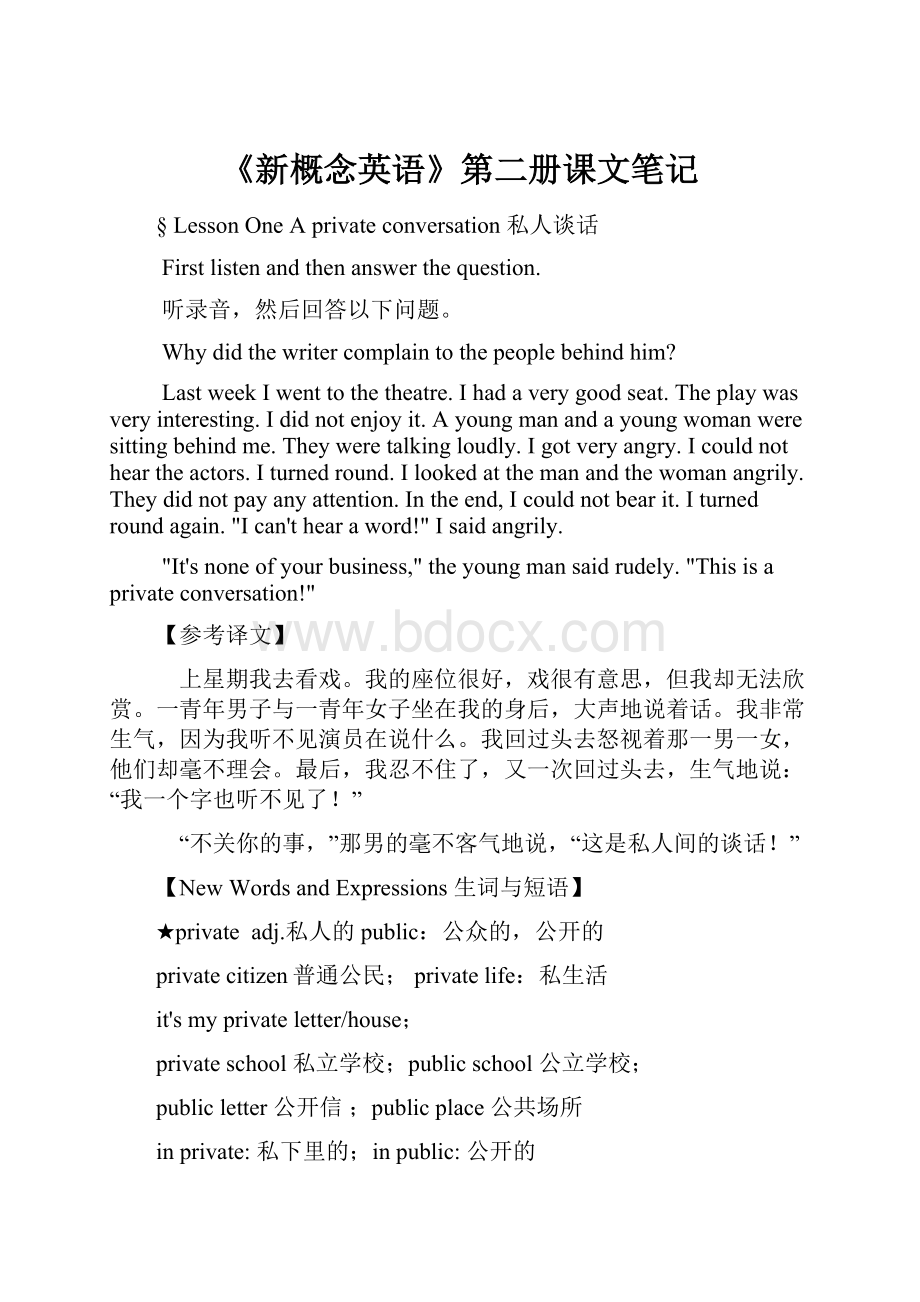 《新概念英语》第二册课文笔记.docx
《新概念英语》第二册课文笔记.docx
- 文档编号:27535998
- 上传时间:2023-07-02
- 格式:DOCX
- 页数:260
- 大小:180.55KB
《新概念英语》第二册课文笔记.docx
《《新概念英语》第二册课文笔记.docx》由会员分享,可在线阅读,更多相关《《新概念英语》第二册课文笔记.docx(260页珍藏版)》请在冰豆网上搜索。

《新概念英语》第二册课文笔记
§LessonOneAprivateconversation私人谈话
Firstlistenandthenanswerthequestion.
听录音,然后回答以下问题。
Whydidthewritercomplaintothepeoplebehindhim?
LastweekIwenttothetheatre.Ihadaverygoodseat.Theplaywasveryinteresting.Ididnotenjoyit.Ayoungmanandayoungwomanweresittingbehindme.Theyweretalkingloudly.Igotveryangry.Icouldnotheartheactors.Iturnedround.Ilookedatthemanandthewomanangrily.Theydidnotpayanyattention.Intheend,Icouldnotbearit.Iturnedroundagain."Ican'thearaword!
"Isaidangrily.
"It'snoneofyourbusiness,"theyoungmansaidrudely."Thisisaprivateconversation!
"
【参考译文】
上星期我去看戏。
我的座位很好,戏很有意思,但我却无法欣赏。
一青年男子与一青年女子坐在我的身后,大声地说着话。
我非常生气,因为我听不见演员在说什么。
我回过头去怒视着那一男一女,他们却毫不理会。
最后,我忍不住了,又一次回过头去,生气地说:
“我一个字也听不见了!
”
“不关你的事,”那男的毫不客气地说,“这是私人间的谈话!
”
【NewWordsandExpressions生词与短语】
★privateadj.私人的public:
公众的,公开的
privatecitizen普通公民;privatelife:
私生活
it'smyprivateletter/house;
privateschool私立学校;publicschool公立学校;
publicletter公开信;publicplace公共场所
inprivate:
私下里的;inpublic:
公开的
Whynothaveaconversationinpublic?
privacy隐私it'saprivacy.n.
★conversationn.谈话,比较正式一些
subjectofconversation:
话题
★talk可以正式,也可以不正式(私人的)
let'shaveatalk.
Theyarehavingaconversation.
conversation用的时候比talk正式,意思上往往不非常正式.
★dialogue:
对话
ChinaandKoreaarehavingadialogue.正式
★chat:
闲聊
★gossip:
嚼舌头
havea+talk/chat/dialogue/conversation/gossip
名词变动词
★theatren.剧场,戏剧;cinema:
电影院
★seatn.座位haveagoodseat(place)
takeaseat:
座下来,就座
takeyourseat/takeaseat
Istheseattaken?
这个座位有人吗?
no/yes
sit:
sitdown,please
seat:
takeyourseat,please
beseated,please更为礼貌
seat是及物动词,后面有宾语
sit是不及物动词,后面不加宾语
sitheissittingthere.
seat后面会加人;seatsb.;seathim;seat:
让某人就座
youseathim.
【语法精粹】
Whenallthosepresent(到场者)____hebeganhislecture.(重点题)
A.sitB.setC.seatedD.wereseated√
sit,sitdown;seat,beseated;takeaseat
★angryadj.生气的;angrilyadv.副词修饰动词
cross=angry;Iwasangry.Hewascross.
★annoyed:
恼火的;Iwasannoyed.
beblueintheface;Iamblueintheface.
★attentionn.注意
Attention,please.请注意
payattention:
注意
payattentionto:
对什么注意
Youmustpayattentiontothatgirl.
payalittleattention:
稍加注意
paymuchattention:
多加注意
paymoreattention:
更多注意
paynoattention:
不用注意
★bear(bore,borne)v.容忍
bear/stand/endure
忍受的极限在加大
Ican'tbear/standyou.
endure:
忍受,容忍;putupwith忍受
Igotdivorced.Icouldnotputupwithhim.
putupwith=bear=stand
★bearn.熊whitebear白熊、北极熊
bearhug:
热情(热烈)的拥抱
givesb..abearhug
★businessn.事
businessman:
生意人;dobusiness:
做生意
gotosomeplaceonbusiness:
因公出差
IwenttoTianjinonbusiness.
★thing可以指事情,也可以指东西
It'smybusiness私人事情
it'snoneofyourbusiness
★rudelyadv.无礼地,粗鲁地;rudeadj.
【课文讲解】
gotothetheatre=seeafilm,gotothecinema
gotothe+地点表示去某地干嘛
gotothedairy去牛奶店
gotothe+人+'s表示去这个人开的店
gotothebutcher's买肉gotothedoctor's去看病
gotoschool:
去上学
gotochurch:
去做礼拜
gotohospital(医院):
去看病
gohome;Iamathome.
跟home相连一定表示没有事情可做,回家休息
★enjoy,enjoyoneself:
玩的开心
enjoy+sth.:
喜欢,从当中得到一种享受
Ilikesomethingverymuch./Ilovesomething.
Ienjoythemusic.
★过去进行时态:
过去的某个时间正在发生的动作
一个故事的背景往往用进行时态描述
I+be+v(ing)weresitting:
当时正座在
Thegirlwasreadingabookinthegarden.Aboycametoher.
★got:
变得,表示一种变化
Iam/wasangry是一个事实
Igotangry:
强调变化过程
got取代be动词,got是一个半联系动词,可以直接加形容词
说话的时候喜欢用缩略.I'mnot,heisn't,theyaren't
写的时候会说:
Iamnot,heisnot,theyarenot
Ididn'tdosth..,Ididnotdosth..
★hear:
听见;hear+人:
听见某人的话
Icouldnothearyou.Begyourpardon?
Icouldn'thearyou./Icouldn'thearaword./Icouldn'tcatchyourwords.
Icouldn'thearyouclearly./Icouldn'tcatchyourwords.
Begyourpardon?
/Icouldn'tcatchyourwords.
★hearaword,aword等于一句话
hearawordofsb..(actors)
Hedidn'tsayaword.
MayIspeaktoJim?
/MayIhaveawordwithJim?
It'snoneofyourbusiness./Noneofyourbusiness./It'smybusiness.
★turnround:
转头
★pay(any)attention表示注意;
对什么加以注意payattentiontosth.
★Thisisprivateconversation!
private:
私人的,不想与别人共享
【KeyStructures关键句型】
陈述句一定是有主语,有动词,有宾语,有句号;
简单陈述句一定不能少的是主语、动词
主语——>动词——>宾语——>状语
1---主语一般有名词或代词构成
2---谓语由动词充当
3---宾语
4---副词或介词短语,对方式或状态提问,往往做状语
Ilikeherverymuch
5---地点状语
6---时间状语可以放在句首或句末,先地点后时间
IlikethegirlverymuchinBeijinglastyear.
如果问何时何地,是一个固定搭配whenandwhere
【Multiplechoicequestions多项选择题】
★payattention:
注意(在思想上)
notice:
注意(=see眼睛看)
★sittingbehind
behind:
在...后面
★infrontof:
在...前面(相对静止的概念)
★before:
在...前面(+词、句子、一定和时间相连)
★above:
在...上面
★aheadof:
在...前面(+时间、位置)(动态的行为)
Hearrivedbeforesixo'clock.
Beforehecameback
Hegoesaheadofme.
★特殊疑问词对后面的答案提问
how(adv.)——对一个方式、状态提问;对形容词、副词、介词短语提问
where——用介词,地点
when——用介词,时间
why——用because回答
★any——用在否定句和疑问句中
★some——用在肯定句中
★none——没有任何东西、没有任何人
Noneknows./Noneofusknows.
★notany=no
not——否定词,要放在非实义动词后面
Hedidn'tpayattention
no——形容词、修饰名词
Ihavenotime./Idon'thaveanytime.
★suffer:
遭受,忍受(精神或肉体上)+痛苦
bear:
忍受=stand
Isuffertheheadache.
Heoftensuffersdefeat.
§LessontwoBreakfastorlunch?
早餐还是午餐?
Firstlistenandthenanswerthequestion.
听录音,然后回答以下问题。
Whywasthewriter'sauntsurprised?
ItwasSunday.InevergetupearlyonSundays.Isometimesstayinbeduntillunchtime.LastSundayIgotupverylate.Ilookedoutofthewindow.Itwasdarkoutside.'Whataday!
'Ithought.'It'srainingagain.'Justthen,thetelephonerang.ItwasmyauntLucy.'I'vejustarrivedbytrain,'shesaid.'I'mcomingtoseeyou.'
'ButI'mstillhavingbreakfast,'Isaid.
'Whatareyoudoing?
'sheasked.
'I'mhavingbreakfast,'Irepeated.
'Dearme,'shesaid.'Doyoualwaysgetupsolate?
It'soneo'clock!
'
【参考译文】
那是个星期天,而在星期天我是从来不早起的,有时我要一直躺到吃午饭的时候。
上个星期天,我起得很晚。
我望望窗外,外面一片昏暗。
“鬼天气!
”我想,“又下雨了。
”正在这时,电话铃响了。
是我姑母露西打来的。
“我刚下火车,”她说,“我这就来看你。
”
“但我还在吃早饭,”我说。
“你在干什么?
”她问道。
“我正在吃早饭,”我又说了一遍。
“天啊,”她说,“你总是起得这么晚吗?
现在已经1点钟了!
”
【NewWordsandExpressions生词与短语】
★untilprep.直到
not……until直到...才;直到...为止
Istayinbeduntiltwelveo'clock.
Ididn'tgetupuntil12o'clock.
后面加(时间状语)从句,前面就是主句
1)Hisfatherdidn'tdieuntilhecameback.(否定)
直到他回来,他爸爸才死。
2)Hisfatherwasaliveuntilhecameback.(肯定)
直到他回来为止,他爸爸都是活着的。
到他回来这一点之前,没死:
notdie;活的:
不加not.
把until作为时间终止线
从句的时间终点之前,这个动作做了还是没做?
做了——肯定;没做——否定.
★outsideadv.外面作状语
Heiswaitingformeoutside.
Itiscoldoutside.
★ring(rang.rung)v.(铃、电话等)响(刺耳的)
Thetelephone(doorbell)isringing.
jingle(bell):
(铃儿)响叮当
给某人打电话:
ringsb..
TomorrowI'llringyou.
打电话(名):
givesb..aring
remembertoringme/remembertogivemearing
戒指(名词)
★auntn.姑,姨,婶,舅妈
uncle:
叔叔
cousin:
堂兄妹
nephew:
外甥
niece:
外甥女
★repeatv.重复
【课文讲解】
★OnSundays:
所有的星期天,每逢星期天
★never:
从来不(可以直接用在动词前面)
=not(变成否定句,前面一定要加助动词)
Idon'tlikeher.=Ineverlikeher.
因为是上个星期,所以时态不是一般现在时。
★lookoutof:
朝窗外看
从...里:
from,outof
★Whataday?
What+a+n.——感叹句
Itisterribleday.==>Whataterribleday!
What+a/an(+a.)+n.(+主语+谓语)
Whataterribleday!
whatagoodgirl(sheis)!
Whataday!
有上下文和一定的语境,才能省略形容词。
★justthen:
就在那时;just只会出现在"现在完成时"
★如果不知道对方性别,可以用it取代
Whoareyou?
/Whoisit?
★bytrain
by直接加交通工具(不能有任何修饰词,复数)
Igooutbybus/ontwobuses.
如果加修饰词,就要换掉by
★I'mcomingtoseeyou.我将要来看你。
becoming表示一般将来
go,comeleave,arrive,land,meet,die,start,return,join...
【Keystructures关键句型】
★Now,oftenandAlways表示现在和经常发生的动作
Now——现在进行时(说话的当时正在发生,现阶段正在发生)
OftenadAlways——一般现在时,是一种习惯,真理,是过去,现在和未来都会发生的事情。
★Heisstillsleeping.他现在还在睡觉。
频率副词往往放在句子中间,实义动词前,非实义动词后。
非实义动词:
1.系动词(be)
2.助动词:
帮助动词构成时态的(do,does,will,shall,have,had,has)
3.情态动词:
(must,can,may)
4.areyoudoing;amleaving;(用进行时态表达将来时:
go,come.leave,arrive,join,return,die,land,meet)
go(Igotobedhungry.形容词做状语)
(rarely很少)
【SpecialDifficulties难点】
★What+a/an+a.+n.+主语+谓语;What对名词感叹
★Heiscausingalotoftrouble
名词:
trouble
主语:
he
动词:
iscausing
What(alotof)trouble(heiscausing)!
【Multiplechoicequestions】
★"notearly"
late(adj./adv.)晚的、迟的
lately(adv.)最近=recently(Howareyougoinglately?
)
★look(vi.):
表示看的动作;后面一定要加介词
see(vt.):
表示看的结果; 后面直接加宾语
watch:
表示观看;后面直接加宾语,但宾语一定是能够活动的东西
★lunch中餐;food食物;dinner正餐;meal一顿饭
★频率副词,放在实义动词前,非实义动词后;
★如果即有实义动词又有非实义动词.要放在两个之间
★疑问句中副词往往放在主语的后面
§LessonthreePleaseSendMeaCard请给我寄一张明信片
Firstlistenandthenanswerthequestion.
听录音,然后回答以下问题。
Howmanycardsdidthewritersend?
Postcardsalwaysspoilmyholidays.Lastsummer,IwenttoItaly.Ivisitedmuseumsandsatinpublicgardens.AfriendlywaitertaughtmeafewwordsofItalian.Thenhelentmeabook.Ireadafewlines,butIdidnotunderstandaword.EverydayIthoughtaboutpostcards.Myholidayspassedquickly,butIdidnotsendcardstomyfriends.OnthelastdayImadeabigdecision.Igotupearlyandboughtthirty-sevencards.Ispentthewholedayinmyroom,butIdidnotwriteasinglecard!
【参考译文】
明信片总搅得我假日不得安宁。
去年夏天,我去了意大利。
我参观了博物馆,还去了公园。
一位好客的服务员教了我几句意大利语,之后还借给我一本书。
我读了几行,但一个字也不懂。
我每天都想着明信片的事。
假期过得真快,可我还没有给我的朋友们寄过一张明信片。
到了最后一天,我作出了一项重大决定。
我早早起了床,买来了37张明信片。
我在房间里关了整整一天。
然而竟连一张明信片也没写成!
【NewWordsandExpressions生词与短语】
★sendv.寄,(通过第三人去)送;take:
某人亲自送
sendsth..tosb../sendsb..sth.
givesb..sth../givesth..tosb..
send/takechildrentoschool
★postcardn.明信片
sendhimacard
namecard/visitingcard:
名片
Hereismynamecard.
IDcard:
身份证
creditcard:
信用卡
cashcard现金支取卡;提款卡
★spoil(spoiledorspoilt)v.使索然无味,损坏
spoil:
把东西的质量变得不好;生活中不顺心的事;宠坏,溺爱
Hisparentsspoiledtheboy.宠坏
Thisspoiledmyday.
Whatyousaidspoiledme.
Hisarrivalspoiledmyholiday.
★break:
打破;
damage:
破坏,程度不一定很重
destroy:
破坏,彻底摧毁
★museumn.博物馆
PalaceMuseum:
故宫
★publicadj.
- 配套讲稿:
如PPT文件的首页显示word图标,表示该PPT已包含配套word讲稿。双击word图标可打开word文档。
- 特殊限制:
部分文档作品中含有的国旗、国徽等图片,仅作为作品整体效果示例展示,禁止商用。设计者仅对作品中独创性部分享有著作权。
- 关 键 词:
- 新概念英语 新概念 英语 第二 课文 笔记
 冰豆网所有资源均是用户自行上传分享,仅供网友学习交流,未经上传用户书面授权,请勿作他用。
冰豆网所有资源均是用户自行上传分享,仅供网友学习交流,未经上传用户书面授权,请勿作他用。


 《崔万志演讲观后感》.docx
《崔万志演讲观后感》.docx
